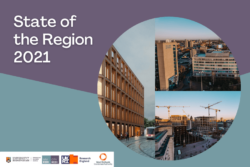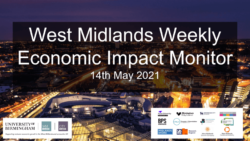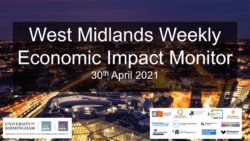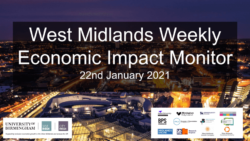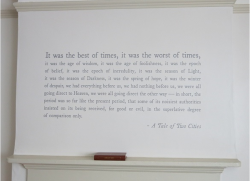This fortnight there have been a number of significant announcements on social care financing, latest furlough data and the PMI, along with a cabinet reshuffle this week. Midlands MP Nadhim Zahawi is the new Education Secretary and Michael Gove has moved to MHCLG. As an avowed public sector reformer, this latter appointment could signal changes … Continue reading “West Midlands Weekly Economic Impact Monitor – 17th September 2021”
Tag: Rebecca Riley
State of the Region 2021 – The Key Challenges Facing the West Midlands
On the 4th August 2021, WMREDI and partners held an event to launch the State of the Region 2021 report. Rebecca Riley, Administrative Director, City-REDI /WM REDI, University of Birmingham and Head of Research and Office for Data Analytics ODA, West Midlands Combined Authority (WMCA), provided an overview of this year’s State of the Region … Continue reading “State of the Region 2021 – The Key Challenges Facing the West Midlands”
West Midlands Weekly Economic Impact Monitor – 14th May 2021
This week we welcome Andy Street back as Mayor. Following the easing of restrictions, signs of recovery and opening up may signal a new positive phase in the pandemic. We are also pleased to let readers know that the WMCA approach through the Monitor and the State of the Region has received recognition from the … Continue reading “West Midlands Weekly Economic Impact Monitor – 14th May 2021”
West Midlands Weekly Economic Impact Monitor – 30th April 2021
Following the easing of lockdown key indicators are showing the start of a return to normal. Footfall statistics indicate that people are more comfortable with leaving home, but the majority of people still feel the pandemic is having a worrying effect on their lives. The latest skills data shows a significant improvement; however, this should … Continue reading “West Midlands Weekly Economic Impact Monitor – 30th April 2021”
West Midlands Weekly Economic Impact Monitor – 5th February 2021
This week there is continuing unrest across the world, as political and social changes are affecting world politics. Make UK highlights that manufacturing is still suffering since exiting the EU and there are key issues with barriers to trade. The World Economic Forum states this week that while no nation has emerged unscathed from the … Continue reading “West Midlands Weekly Economic Impact Monitor – 5th February 2021”
West Midlands Weekly Economic Impact Monitor – 22nd January 2021
This week we have seen significant changes in the USA with the inauguration of the 46th President; this could signal changing relationships which are yet to be understood. The current lockdown is adding uncertainty to business planning and forecasting, the impacts of the new EU trade deal are continuing to unfold, resulting in demonstrations by … Continue reading “West Midlands Weekly Economic Impact Monitor – 22nd January 2021”
Battlegrounds or Labour Consolidation? – What to watch out for in this week’s local elections
This is the first England wide test of electoral opinion since last year’s snap general election. Seats on around 150 councils and according to Britain Elects 4,425 seats will be up for grabs, 40 per cent (1,833) of which are in London. This includes most seats in the city conurbations, such as all 32 London … Continue reading “Battlegrounds or Labour Consolidation? – What to watch out for in this week’s local elections”
Commonwealth 2022 – How to maximise the impact of Mega Events
The Commonwealth Games coming to Birmingham have the potential to be a catalyst for change, the challenge is to maximise that change within the demanding timescales. Looking to past mega events and evaluations can help us quickly adapt and adopt best practice and make decisions at speed. Yesterday morning I was part of a panel … Continue reading “Commonwealth 2022 – How to maximise the impact of Mega Events”
Women in Economic Development Research – Why the Woman’s Voice is Crucial: Part 1, View from a Business Development Director
With the imminent arrival of International Women’s Day on the 8th March, City-REDI will be publishing a series of blogs celebrating women in economic development and the contribution we make. They are inspired by the current experience of City-REDI which is pretty unusual in its numbers of women at all levels in the team; from … Continue reading “Women in Economic Development Research – Why the Woman’s Voice is Crucial: Part 1, View from a Business Development Director”
Devolution: Are cities on track in the worst of times?
Regardless of the arguments for and against, the subject of devolution is here to stay. The unprecedented interest levels in the EU Referendum meant that record numbers of people voted, and at its core, this was a reflection on devolution, and who makes decisions on our behalf. So, how far has devolution come? In a … Continue reading “Devolution: Are cities on track in the worst of times?”


